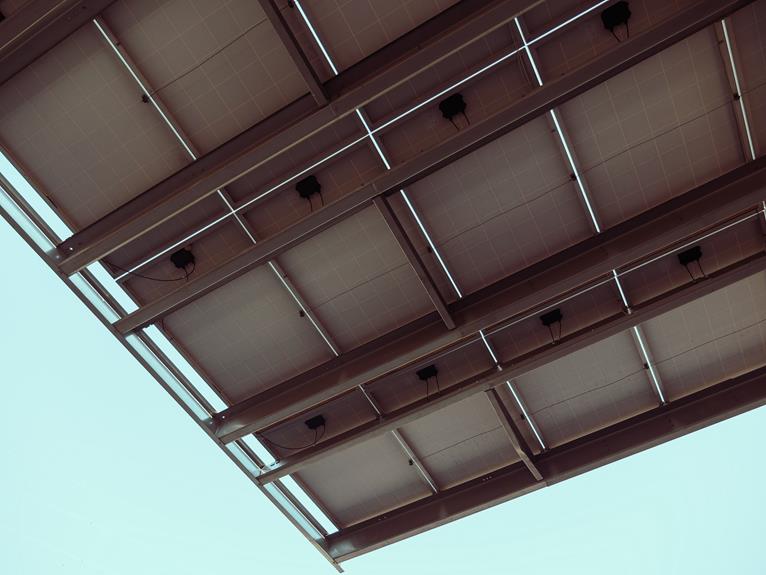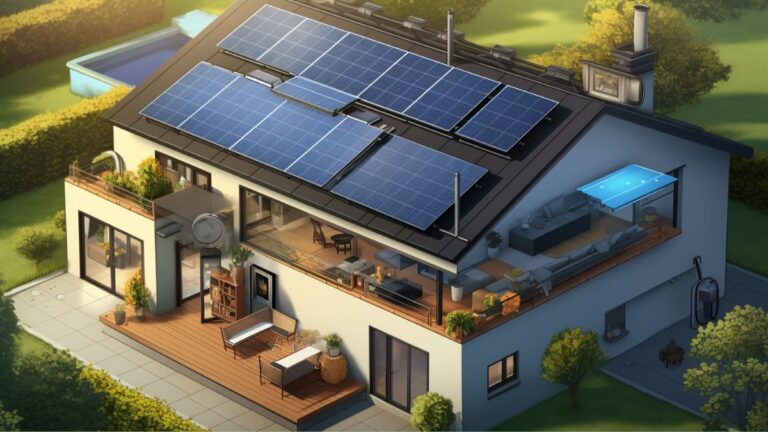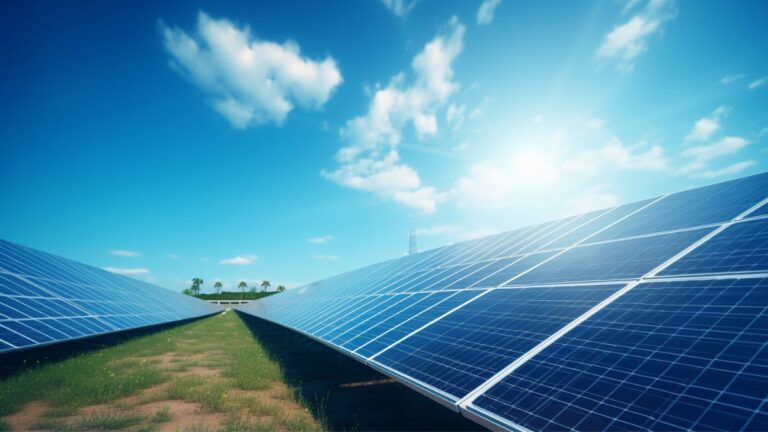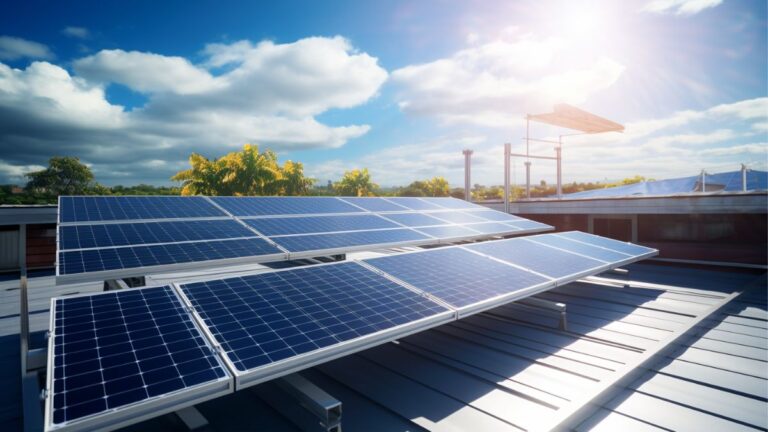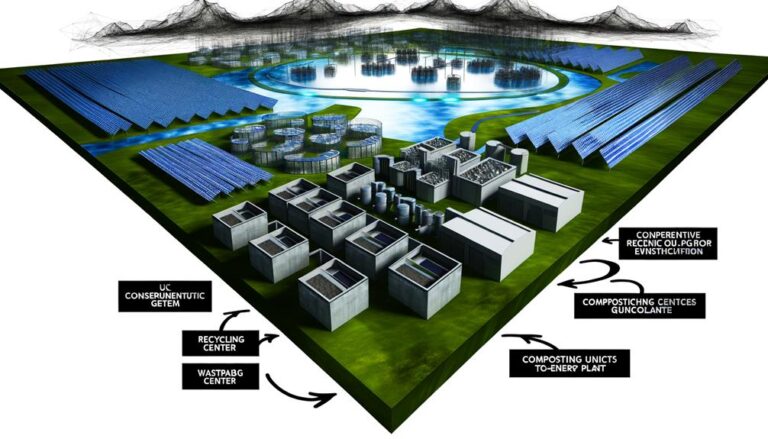The Advantages of Solar Panels for Commercial Buildings
Have you ever wondered how commercial buildings can benefit from solar panels? Well, wonder no more! In this article, we’ll delve into the advantages of solar panels for commercial buildings.
One major advantage is reduced energy costs. Solar panels harness the power of the sun to generate electricity, which can significantly reduce a building’s reliance on traditional energy sources. By producing their own energy, businesses can save money on their utility bills.
Another benefit is environmental sustainability. Solar power is a clean and renewable energy source, meaning it doesn’t produce harmful emissions or contribute to climate change. Installing solar panels can help businesses reduce their carbon footprint and demonstrate their commitment to sustainability.
Increased property value is yet another advantage. Commercial buildings with solar panels are seen as more desirable and attractive to potential buyers or tenants. The addition of solar panels can increase a property’s value and set it apart from competitors in the market.
Government incentives are also worth considering. Many governments offer financial incentives and tax credits to businesses that invest in solar energy. These incentives can offset the upfront costs of installing solar panels and provide additional financial benefits over time.
Lastly, solar panels offer energy independence. By generating their own electricity, businesses are less reliant on the grid and are protected from energy price fluctuations. This can provide stability and security in an unpredictable energy market.
By the end of this article, you’ll have a clear understanding of why solar panels are a smart investment for businesses looking to save money and make a positive impact on the environment. So let’s dive in and explore the world of solar power for commercial buildings!
Key Takeaways
- Cost savings and energy efficiency: Solar panels help businesses save money on utility bills and improve energy efficiency by converting sunlight into electricity.
- Environmental benefits: Installing solar panels reduces carbon footprint, mitigates climate change, and produces zero greenhouse gas emissions during operation.
- Increased property value: Solar panels increase property value by offering long-term financial benefits, improving marketability, and protecting against rising energy costs.
- Government incentives and tax benefits: Governments offer incentives such as tax credits, grants, and rebates for solar panel investments, reducing upfront installation costs and lowering energy bills.
Reduced Energy Costs
Installing solar panels on your commercial building can significantly lower your energy costs. By harnessing the power of the sun, solar panels provide a clean and renewable source of energy that can greatly reduce your reliance on traditional power sources. This not only helps the environment but also saves you money in the long run.
Solar panels improve energy efficiency by converting sunlight into electricity, meaning you can generate your own power and reduce your consumption from the grid. This reduces your monthly energy bills, allowing you to allocate those savings to other areas of your business.
Moreover, solar panels have a long lifespan, providing long-term savings as they require minimal maintenance and have a low risk of failure. Investing in solar panels for your commercial building is a smart financial decision that not only lowers your energy costs but also contributes to a more sustainable future.
Environmental Sustainability
By reducing your reliance on traditional power sources and generating your own clean and renewable energy, solar panels for your commercial building contribute to environmental sustainability. Renewable energy is the key to a greener future, and solar panels allow you to harness the power of the sun to meet your energy needs.
By using solar energy, you significantly reduce your carbon footprint, as solar power produces zero greenhouse gas emissions during operation. This means that you’re actively mitigating climate change and helping to preserve the planet for future generations.
Additionally, solar panels require minimal maintenance and have a long lifespan, ensuring that your investment in renewable energy continues to benefit the environment for years to come.
Make a positive impact on the planet by embracing solar energy and reducing your carbon footprint with solar panels for your commercial building.
Increased Property Value
When you invest in solar panels for your commercial building, you can expect an increase in property value due to the long-term financial benefits they provide. Installing solar panels not only reduces energy costs but also adds value to your property, making it more attractive to potential buyers.
Here are three reasons why solar panels can improve your property’s resale value and marketability:
- Increased Resale Value: Solar panels are seen as a valuable asset by potential buyers, as they offer long-term savings on energy bills. Studies show that properties with solar panels tend to sell faster and at a higher price compared to those without.
- Improved Marketability: In today’s environmentally conscious world, many consumers prioritize sustainable features when making purchasing decisions. By having solar panels, your commercial building becomes more marketable, appealing to those who prioritize energy efficiency and environmental responsibility.
- Long-Term Financial Benefits: Solar panels provide a reliable source of clean energy, reducing reliance on traditional energy sources. This not only saves money but also protects against rising energy costs in the future, making your property more financially secure.
Government Incentives and Tax Benefits
Take advantage of government incentives and tax benefits when investing in solar panels for your commercial building.
The government recognizes the importance of renewable energy and offers various incentives to encourage businesses to adopt solar power. These incentives can include tax credits, grants, and rebates, all of which can significantly reduce the upfront costs of installing solar panels.
Additionally, by investing in solar panels, you can benefit from financial savings in the form of lower energy bills. Solar energy is a clean and renewable source of power, which means that you can generate your own electricity and reduce your reliance on the grid. This not only lowers your energy costs but also protects your business against future price hikes in electricity.
Energy Independence
Achieve energy independence by installing solar panels on your commercial building. Solar panels allow you to generate your own electricity, reducing your dependence on traditional power sources. Here are three key benefits of achieving energy independence through solar panel installation:
- Reduced reliance on the grid: By generating your own electricity, you decrease your dependence on the grid and the unpredictability of utility rates. This ensures a stable and consistent power supply for your commercial building.
- Grid integration for excess energy: When your solar panels generate more electricity than you consume, you can feed the excess back into the grid. This not only helps offset your energy costs but also contributes to the overall grid stability.
- Long-term savings: Solar panels have a long lifespan, typically lasting 25 years or more. By investing in solar energy, you can significantly reduce your electricity bills over the long term, resulting in substantial savings for your commercial building.
Conclusion
In conclusion, installing solar panels on commercial buildings brings numerous advantages. Not only does it significantly reduce energy costs, but it also promotes environmental sustainability and increases property value.
Moreover, government incentives and tax benefits further incentivize businesses to adopt solar energy, ensuring energy independence.
Interestingly, a recent study found that commercial buildings with solar panels can save up to 75% on their electricity bills, highlighting the immense potential for cost savings and long-term sustainability.
